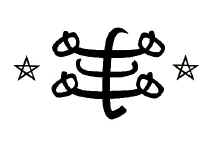
one of the many symbols of the Baha'i faith
Ascension of Baha'u'llah

one of the many symbols of the Baha'i faith
The ascension of the Baha'u'llah is an important observance to members
of the Baha'i faith as today in 1892 the leader of the Baha'i faith
died.
He
died quietly at the age of 75, still marginally a prisoner but
permitted to live outside the walls of Akká in a mansion known as
Bahjí. The relative tranquility of His final days on Earth stand in
marked contrast to the tumult that had surrounded Him for much of His
life, yet it proved to be merely the calm before another storm for
'Abdu'l-Bahá, his oldest son and his successor.
Here is a short review of Bahá'u'lláh's life. Born to a noble family in
Persia. He might have lived a life of relative ease. He was generally
held to be a wise and good man whose charity had earned him the
nickname "Father of the poor". But when word of the Báb reached him, he
embraced the new religion and became one of its staunchest supporters,
jeopardizing everything he had. Over the next few years he was briefly
imprisoned twice, tortured on one occasion and narrowly escaped an
official death sentence when Muhammád Sháhpassed away before issuing
the order.
Bahá'u'lláh's imprisonment in August 1852 on trumped-up charges
connected with an attempt by two deranged Bábís to assassinate
Násiri'd-Dín Sháh set the stage for the rest of his life. In that
prison (Síyáh-Chál, literally "the Black Pit") He experienced a
revelation from God telling him that he was the Promised One whose
coming the Báb had foretold. This revelation was born while he was
surrounded by the worst of criminals and weighed down by a chain so
heavy that he would bear scars from it for the rest of his life. A far
cry from the life he had until that time known.
Released from prison in November, Bahá'u'lláh was stripped of wealth
and property and banished to Baghdád, the first of four banishments he
would suffer. In each place to which he was sent, his wisdom and
character earned him the admiration of people from all walks of life,
but in each case the authorities, fearful of his influence, sent him
further into exile. Thus he was moved from Baghdád to Constantinople,
Adrianople, and finally the prison city of Akká in the Holy Land. While
the authorities plotted to be rid of him, his own half-brother, Mirzá
Yahyá, who the Báb had appointed as head of the Faith until the
Promised One arose, grew increasingly jealous of Bahá'u'lláh's
influence among the Bábís. Yahyá attempted to claim the station of the
Promised One for himself and plotted Bahá'u'lláh's death, once smearing
poison on his teacup. Bahá'u'lláh nearly died, and suffered from a hand
tremor for the rest of his life.
Although despised and threatened on all sides, he never once ceased to
proclaim the message God had entrusted to him. His writings amount to
some 100 volumes and were addressed to kings and commoners, friends and
enemies, believers and deniers. For 40 years he proclaimed his Message
until his dying breath.